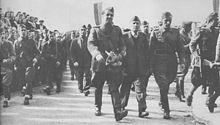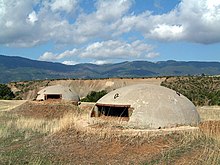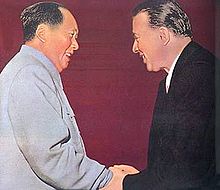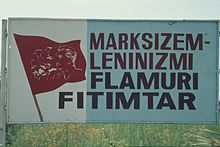People's Socialist Republic of Albania
The government implemented reforms which were aimed at modernizing Albania, and they resulted in significant gains in the areas of industry, agriculture, education, the arts, and culture, which contributed to a general increase in the Albanian population's standard of living.However, these developments coincided with political repression by the secret police, the Sigurimi, for the purposes of preventing a counter-revolution, which included dismissal from employment, imprisonment in forced labor camps and executions.The internal affairs minister, Koçi Xoxe, "an erstwhile pro-Yugoslavia tinsmith", presided over the trial of many non-communist politicians who were condemned as "enemies of the people" and "war criminals".Under the Agrarian Reform Law, which redistributed about half of Albania's arable land, the government confiscated property belonging to absentee landlords and people not dependent on agriculture for a living.[citation needed] In December 1945, Albanians elected a new People's Assembly, but voters were presented with a single list from the Communist-dominated Democratic Front (previously the National Liberation Movement).In late 1945 and early 1946, Xoxe and other party hard-liners purged moderates who had pressed for close contacts with the West, a modicum of political pluralism, and a delay in the introduction of strict communist economic measures until Albania's economy had more time to develop.In July 1946, Yugoslavia and Albania signed a treaty of friendship and cooperation that was quickly followed by a series of technical and economic agreements laying the groundwork for integrating the Albanian and Yugoslav economies.Yugoslav investments led to the construction of a sugar refinery in Korçë, a food-processing plant in Elbasan, a hemp factory at Rrogozhinë, a fish cannery in Vlorë, and a printing press, telephone exchange, and textile mill in Tirana.Apparently attempting to buy support inside the Albanian Communist Party, Belgrade extended Tirana credits which were worth 40 million USD, an amount which was equivalent to 58% of Albania's 1947 state budget.Three days later, Tirana gave the Yugoslav advisers in Albania 48 hours to leave the country, rescinded all bilateral economic agreements with its neighbor, and launched a virulent anti-Yugoslav propaganda blitz that transformed Stalin into an Albanian national hero, Hoxha into a warrior against foreign aggression, and Tito into an imperialist monster.Following a wave of subversive activity, including the failed infiltration and the March 1951 bombing of the Soviet embassy in Tirana, the Communist authorities implemented harsh internal security measures.In 1949 Albania adopted the basic elements of the Soviet fiscal system, under which state enterprises paid direct contributions to the treasury from their profits and kept only a share authorized for self-financed investments and other purposes.In 1951 the Albanian government launched its first five-year plan, which emphasized utilizing the country's oil, chromite, copper, nickel, asphalt, and coal resources; expanding electricity production and the power grid; increasing agricultural output; and improving transportation.Stalin died in March 1953, and apparently fearing that the Soviet leader's demise might encourage rivals within the Albanian party's ranks, neither Hoxha nor Shehu risked traveling to Moscow to attend his funeral.In July 1953, Hoxha handed over the foreign affairs and defense portfolios to loyal followers, but he kept both the top party post and the premiership until 1954, when Shehu became Albania's prime minister.There was further tension over a Comecon plan for integrating the East European economies, which called for Albania to produce agricultural goods and minerals instead of emphasizing the development of heavy industry.By 1958, Albania stood with the People's Republic of China (PRC)[18] in opposing Moscow on issues of peaceful coexistence, de-Stalinization, and Yugoslavia's "separate road to socialism" through decentralization of economic life.But given their tight control of the party machinery, army, and Shehu's secret police, the Directorate of State Security (Drejtorija e Sigurimit të Shtetit—Sigurimi), the two Albanian leaders easily parried the threat.During the congress, the Albanian government announced the broad outlines of the country's Third Five-Year Plan (1961–65), which allocated 54% of all investment to industry, thereby rejecting Khrushchev's wish to make Albania primarily an agricultural producer.Moscow then withdrew all Soviet economic advisers and technicians from the country, including those at work on the Palace of Culture, and halted shipments of supplies and spare parts for equipment already in place in Albania.China lent Albania money on more favorable terms than Moscow, and, unlike Soviet advisers, Chinese technicians earned the same low pay as Albanian workers and lived in similar housing.Half of its imports and exports had been geared toward Soviet suppliers and markets, so the souring of Tirana's relations with Moscow brought Albania's foreign trade to near collapse as China proved incapable of delivering promised machinery and equipment on time.Railing against a "white-collar mentality," the authorities also slashed the salaries of mid- and high-level officials, ousted administrators and specialists from their desk jobs, and sent such persons to toil in the factories and fields.In addition, the government attacked dissident writers and artists, reformed its educational system, and generally reinforced Albania's isolation from European culture in an effort to keep out foreign influences.The 1976 Constitution of the People's Socialist Republic of Albania later stipulated in Article 37 that "The state recognizes no religion whatever and supports atheist propaganda for the purpose of inculcating the scientific materialist world outlook in people" and Article 55 explicitly forbade the formation of "any type of organization of a fascist, anti-democratic, religious, and anti-socialist character" and stated that "Fascist, anti-democratic, religious, war-mongering, and anti-socialist activities and propaganda, as well as the incitement of national and racial hatred are prohibited.The great popular discussion, characterized by a free and fruitful thrashing out of opinions, by lively and constructive debate, was a clear expression of our socialist democracy in action and the genuine sovereignty of the people.During the Cultural and Ideological Revolution, traditional kinship links in Albania, which were centered on the patriarchal family, were shattered by the postwar repression of clan leaders, collectivization of agriculture, industrialization, migration from the countryside to urban areas, and suppression of religion.The constitution continued to emphasize national pride and unity, the idea of autarky was enshrined in law and the government was prohibited from seeking financial aid or credits or forming joint companies with partners from capitalist or revisionist communist countries.[28] The very gradual and slight reforms intensified as Mikhail Gorbachev introduced his new policies of glasnost and perestroika in the Soviet Union, culminating in the fall of the Berlin Wall in November 1989 and the collapse of communist governments across Central and Eastern Europe.After Nicolae Ceaușescu (the leader of Communist Romania) was executed in a revolution in December 1989, Alia expedited his reforms, apparently concerned about violence and his own fate if radical changes were not made.







AlbaniaAlbania (disambiguation)EmblemTi Shqipëri, më jep nder, më jep emrin ShqipëtarProletarë të të gjitha vendeve, bashkohuni!Himni i FlamuritWarsaw PactComeconTiranaAlbanianState atheismDemonym(s)Marxist–Leninistsocialist republicHoxhaisttotalitarian dictatorshipEnver HoxhaRamiz AliaChairman of the Presidium of the People's AssemblyOmer NishaniHaxhi LleshiPrime MinisterMehmet ShehuAdil ÇarçaniPeople's AssemblyCold WarDemocratic GovernmentAlbanian–Soviet splitConstitution amendedSino-Albanian splitFall of communismDemocratic elections1992 Albanian parliamentary electionFrangaAlbanian lekDemocratic Government of AlbaniaRepublic of AlbaniaEastern BlocRepublicsArmeniaAzerbaijanByelorussiaEstoniaGeorgiaKazakhstanKarelia-FinlandKirghiziaLatviaLithuaniaMoldaviaRussiaTajikistanTurkmeniaTranscaucasiaUkraineUzbekistanAfghanistanAngolaBulgariaCzechoslovakiaEast GermanyEthiopiaGrenadaHungaryKampucheaMongoliaMozambiqueNorth KoreaPolandRomaniaSomaliaSouth YemenVietnamNorth VietnamYugoslaviaCominformWorld Federation of Trade UnionsWorld Federation of Democratic YouthOppositionAnti-Soviet partisansCroatiaSerbiaGuerrilla war in the Baltic statesSoviet occupationOperation JunglePoland 1944–1989Poznań 19561980–89Plzeň 1953East Germany 1953Georgia 1956Hungary 1956Novocherkassk 1962Prague 1968InvasionMoscowCzechoslovakia 1976–1990Romania 1977Kazakhstan 1986Brașov 1987Tbilisi 1989Ukraine 1989–1991Baku 1990Lithuania 1991Riga 1991DissentSovietto Hong KongMarshall PlanCzechoslovak coupTito–Stalin splitBerlin BlockadeKorean WarSecret SpeechSino-Soviet splitDe-satellization of the Socialist Republic of RomaniaBerlin WallCuban Missile CrisisVietnam WarCuban intervention in AngolaAfghan War1980 Moscow Olympics1984 Los Angeles OlympicsGulf WarSinging RevolutionPolish Round Table Agreement